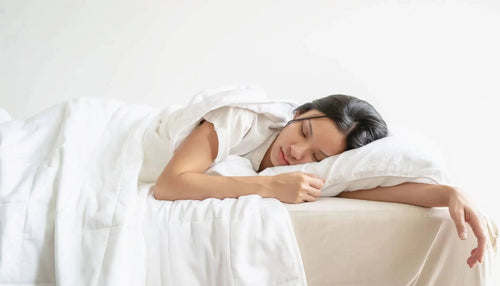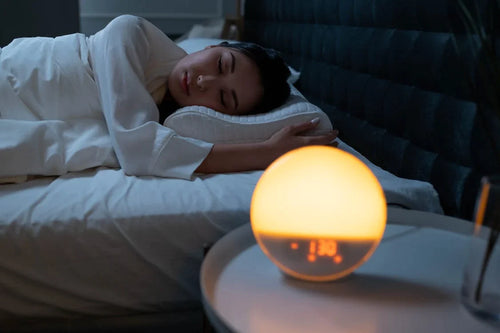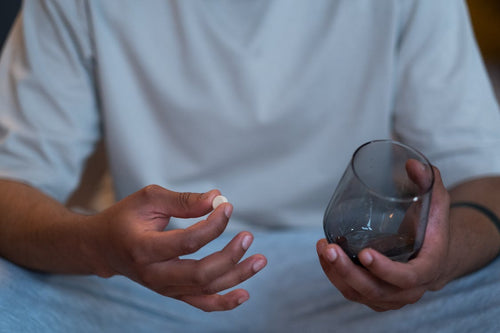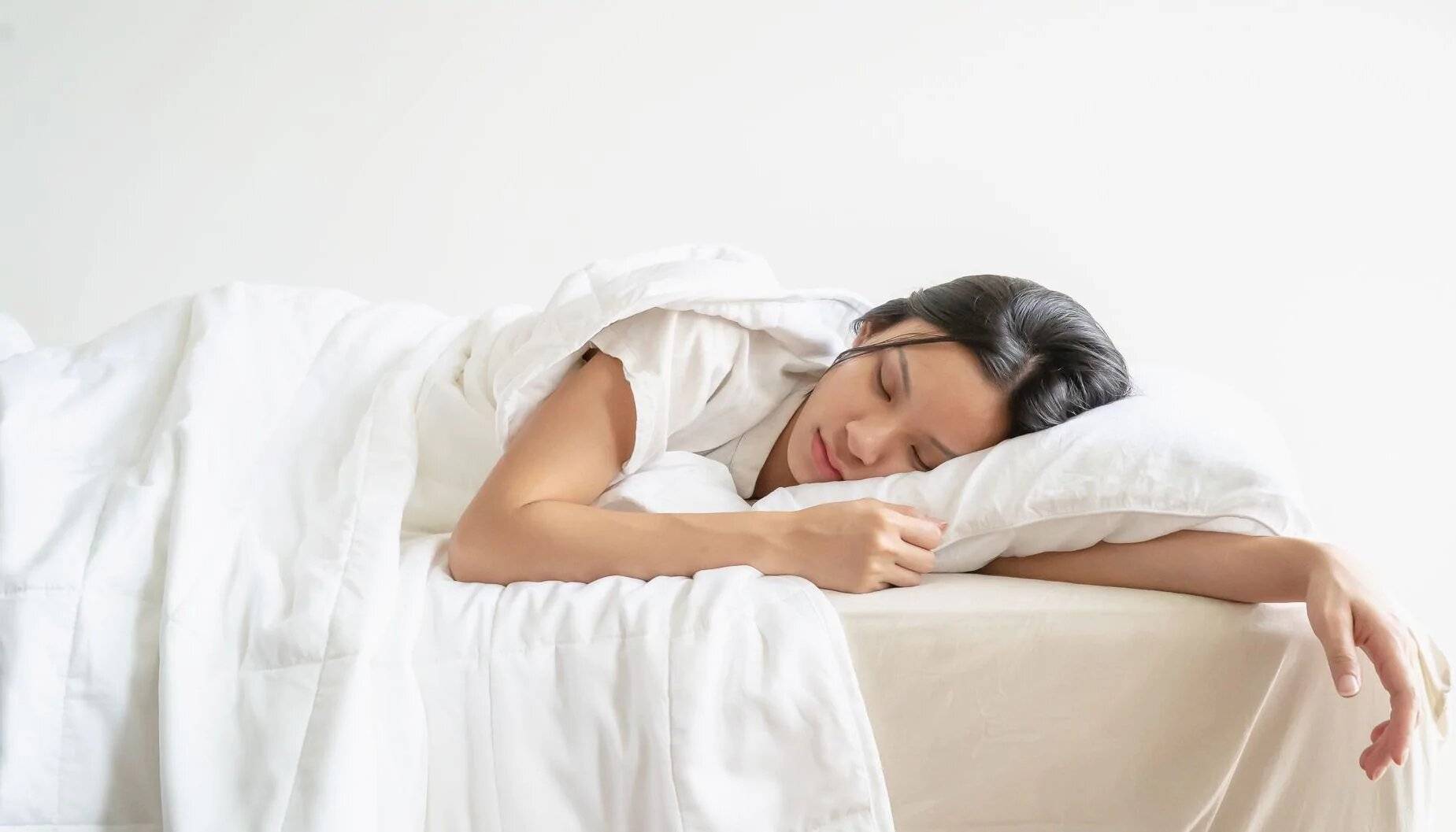
Featuring Weavve’s TENCEL™ Lyocell Duvet
As we sleep, we experience an interesting phenomenon called dreaming. It’s extraordinary because it serves as a window into your unconscious mind, letting us see images and even live a fleeting life we otherwise couldn’t while awake.
You may already know that people experience them, but have you ever wondered what dreams mean and why or how they affect sleep? Read on to learn more about dreaming.
table of contents
What Are Dreams? Go to Section
Causes of Dreams Go to Section
Mind clearing
Memory preservation
Incidental brain activity
When Do We Dream? Go to Section
Different Types of Dreams Go to Section
Passive imagination
Dream illusions
Dream-hallucinations
Benefits of Dreaming Go to Section
Process emotions
Improve memory
May help with depression
Do Dreams Affect Sleep? Go to Section
What Dreams Mean Go to Section
How to Sleep Well Without Dreams or Night Terrors Go to Section
WHAT ARE DREAMS?
Dreams are visual images and stories that the mind conceives during sleep. They can be fun, entertaining, upsetting, bizarre, or frightening. They can provoke strong emotions, depending on their content.
Dreaming is a universal human experience, but it is unique for everyone. For instance, it usually involves visual imagery but can also include all of the senses. Some people also dream in color, while others in black and white.
Typical Characteristics of Dreams
- First-person perspective
- Involuntary
- May be nonsensical
- May include people and other elements from the dreamer’s waking life
CAUSES OF DREAMS
Sixty-five percent of dream elements come from waking life experiences. This is why we may encounter our friends and family and even complete the activities we usually do during our state of consciousness in our dreams. Because of this, dreams are said to be the “reactivation of daily life.”
Due to their unique nature, dreams are challenging to study in a laboratory. This is why much of them remains a mystery. However, sleep experts came up with these theories to answer why do we dream:
Mind Clearing
Dreaming could be a way to get rid of unnecessary or erroneous information. As we dream, our brains experience an instant replay where events during our waking lives get reviewed and analyzed.

Image by @vanyaoboleninov from Pexels
Memory Preservation
According to sleep experts, dreams may be a way to process memory and consolidate information collected during the day. They transfer memories from short-term to long-term storage. As a result, they clear the mind, help with informational recall, and offer a fresh start for the brain before the next waking day.
Incidental Brain Activity
Dreams may also be simply a by-product of sleep. They don’t necessarily have an essential purpose or insightful meaning.
When Do We Dream?
Do you also wonder which stage of sleep do you dream? Or do you dream in deep sleep?
The fact is it occurs at any time during sleep. However, the most vivid dreaming takes place during rapid eye movement (REM), the sleep cycle dream stage. Interestingly, some individuals may experience a phenomenon called “lucid dreaming” where they become aware that they are dreaming.
REM sleep takes place around 90 minutes after falling asleep and lasts 10 minutes. The brain is the most active during this stage, so dreams during this phase are usually more vivid or bizarre. On the contrary, the ones during the non-REM stage tend to have more coherent content.
On average, dream duration typically lasts for two hours per night. Also, most REM sleep dreams occur during the second half of a regular sleep session. In other words, dream time is usually hours before we wake up.
Different Types Of Dreams
According to psychology, dreaming can be categorized into three main types described briefly below.
Passive Imagination
This may include daydreaming or dreaming during light sleep controlled by the subconscious mind.
Dream Illusions
Triggered by external stimuli, these are images you have brought by environmental conditions such as temperature, aroma, and texture.

For example, someone having night sweats may dream of bathing under the blazing heat of the sun. Meanwhile, snuggling under soft and luxurious duvet may make people dream of stepping on the clouds.
Dream-hallucinations
These may be enforced by one’s desires and impulses. For instance, your crush or loved ones are most likely to appear in your sleep than complete strangers.
Benefits of Dreaming
Dreams were discovered to be helpful to health. They offer these benefits:
Process Emotions
Dreaming may force us to deal with imagined experiences while asleep. Because of this, it may help rehearse feelings in different imagined contexts. In effect, it manages emotions and prepares the brain to face challenges and threats in waking life.
The theta brain waves during REM sleep and dreams consolidate memories. The more we dream about emotionally intense experiences, the better we learn to process difficult experiences while awake. In short, dreams promote trauma recovery and mood regulation.
Improve Memory
It’s no secret that sleep helps retain new knowledge. However, it’s not common knowledge that dreaming helps improve memory.

In a study conducted by PubMed Central, participants were asked to play a virtual reality maze and tested to recall things in the maze. Half of the participants fell asleep, and they performed better during the test than the others. Some also dreamed of the maze, which allowed them to improve ten times faster than the rest of the respondents.
May Help with Depression
The dream process may help manage depression symptoms. A study involving divorced women with untreated clinical depression who dreamed of their ex-spouses or relationship scored better on mood tests.
They were also more likely to recover from depression. While dreams on their own weren’t enough to solve their problem, they gave clarity to the participants’ perspectives.
Do Dreams Affect Sleep?
One of the common sleep myths is that dreaming means bad sleep, but that isn’t true. In fact, it is part of healthy sleep.
Dreams are linked to enhanced memory, thinking, and emotional processing. Because of this, experts believe that they reflect or contribute to better sleep quality.
This phenomenon can sometimes affect sleep or mental health. This is especially true for dreams involving traumatic or disturbing elements.
This terror episode that causes distress and awakens sleepers from sleep can be considered a nightmare or a night terror. Sometimes, a bad dream may be accompanied by sleep paralysis. Since it can make it more difficult to move between sleep cycles or go back to sleep, it may influence daytime thinking, mood, or energy level.
- Stress
- Trauma
- Emotional difficulties
- Fear
- Use of certain drugs or medications
- Illness
What Dreams Mean
Dreams are intriguing because they are mysterious. While dreaming is not fully understood, many people use dream analysis to determine the meanings behind them.

Image by @tim-grundtner from Pexels
Here are some common dream themes and their possible interpretations:
Common Dream Themes
Possible Dream Interpretation
Being naked or getting humiliated in public
You are worried that people will notice your shortcomings
Losing teeth
You are concerned about aging or how others think of you
Failing a test
You are trying to overcome a challenge, and you don’t feel confident about dealing with it
Falling
You feel that your life is out of control
How to sleep well without dreams or night terrors
Whether you want to sleep more and dream less or attract good dreams, it all boils down to getting quality sleep. This also helps in keeping nightmares away and remembering dreams better. Some believe that poor dream recall is a sign of inadequate rest.
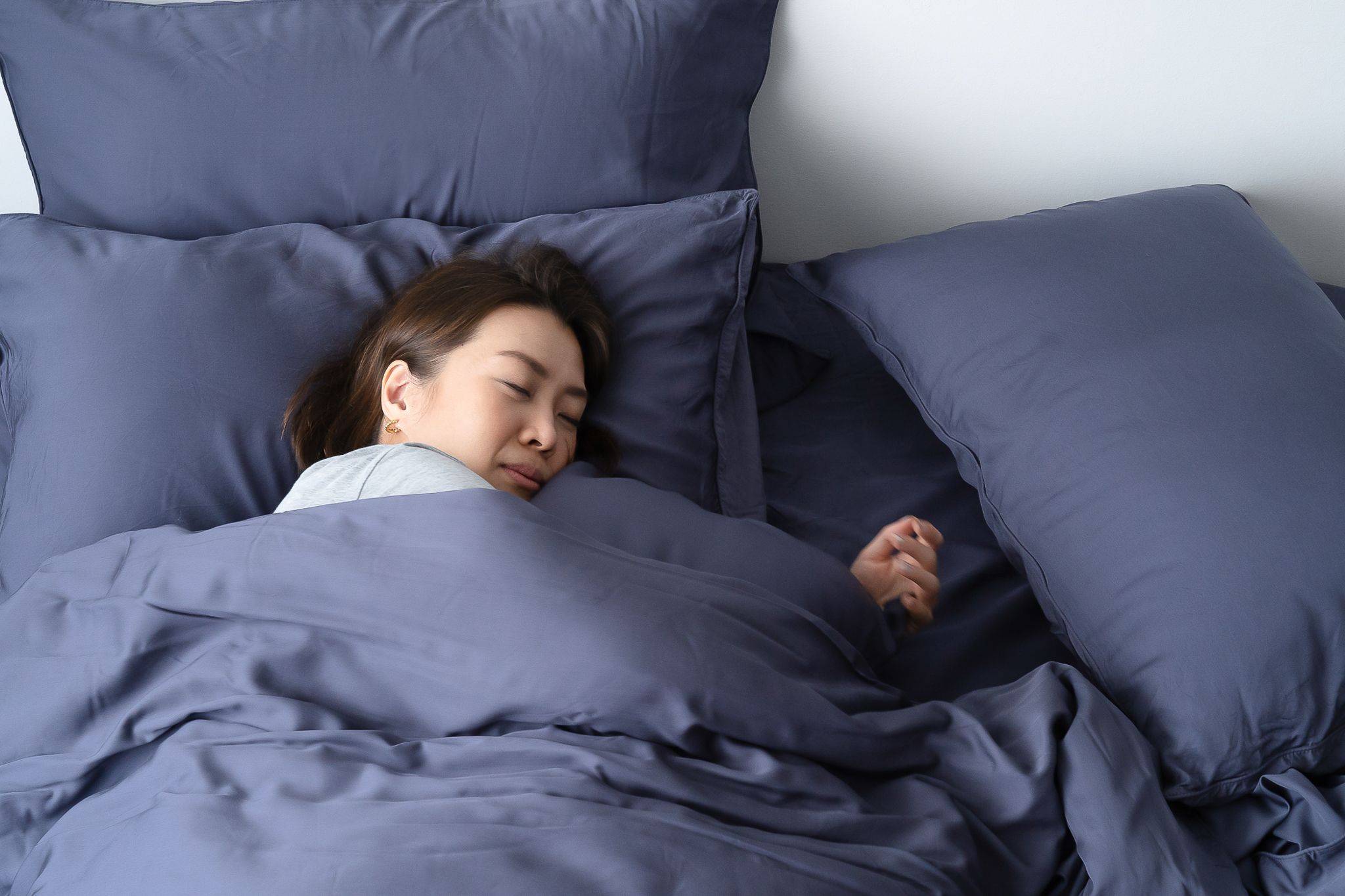
Featuring Weavve’s Signature TENCEL™ Duvet Cover Set in Midnight Blue
- Make your bedroom as comfortable as possible. Choose your bedding according to your needs and preferences. Considering we spend a third of our lives sleeping, it is a smart move to invest in high-quality duvet covers and bed sheets, helping you get the right amount of REM sleep.
- Have a regular sleep-wake schedule to keep your circadian rhythm or biological clocks in sync.
- Avoid alcohol and caffeine before bedtime as they can disrupt your cycle.
- Try lucid dreaming. It’s good to force your mind to recall your dreams before going to bed.
- Gradually wake up and write things down if you can.
DISCOVER WEAVVE’S BEDDING COLLECTION
TENCEL™ Lyocell Bed Sheets
Prized for its breathability, ultra-soft feeling, antibacterial properties, and sustainability, TENCEL™ lyocell fabric makes a great option for luxury bed sheets.

Featuring Weavve’s TENCEL™ Deluxe Set in Cloud White
Weavve’s TENCEL™ lyocell bed sheets are made with lyocell fibers (100% Lenzing TENCEL™) spun into the finest threads with an 80s yarn count. They are guaranteed stronger, smoother, and lighter since they are made from delicate single-ply threads and woven into a 400 thread count fabric.
TENCEL™ Lyocell Duvet
Upgrade your bedroom and enhance sleep with the first 100% TENCEL™ lyocell duvet in Singapore! The fluffy, soft, and lightweight feel of the material will lull you to a deep slumber.
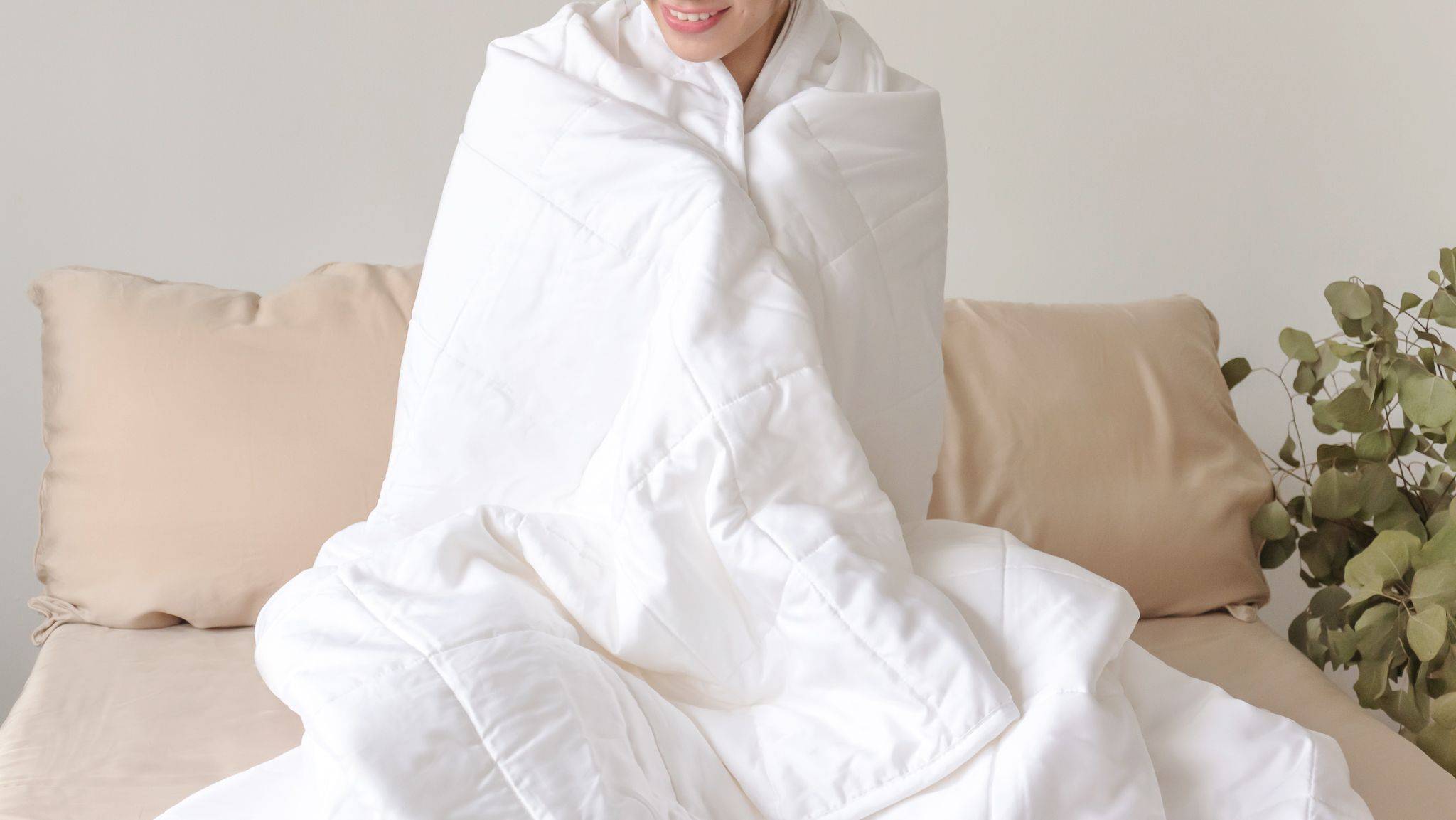
Featuring Weavve’s TENCEL™ Lyocell Fiber Duvet
Known for being eco-friendly, TENCEL™ lyocell fibers are made from 100% sustainably sourced eucalyptus wood. The closed loop production process recycles water and solvents at 99% recovery rate.
If you want to sleep green and comfy, our cozy yet thermoregulating TENCEL™️ lyocell duvet is the way to go. You may also look into the comparison between duvet, quilt, and comforter to find the perfect cover for you.
Responsibly Made
Here at Weavve, we pride ourselves on being committed to responsible sourcing, production, sale and use of our products. We take great effort in ensuring that our decisions account for all the people who help build our products, the environment and our consumers. From Standard 100 by Oeko Tex® certified sheets to SEDEX certified factories, Weavve makes sure that everyone is cared for at every step of the way.

100 Days to Sleep On It
Buying a sheet should be easy and delightful. Here at Weavve, we are fully committed to making exceptional products and our 100 day free return policy makes it easy for you to take the leap of faith, especially for first time users. Learn more about our 100 Day Free Trial.































